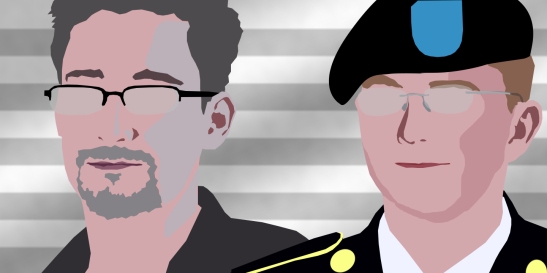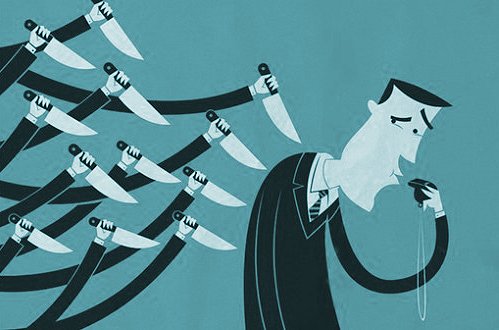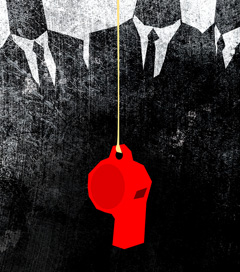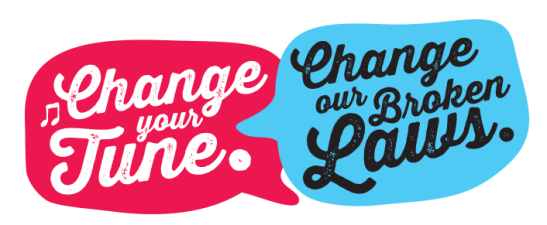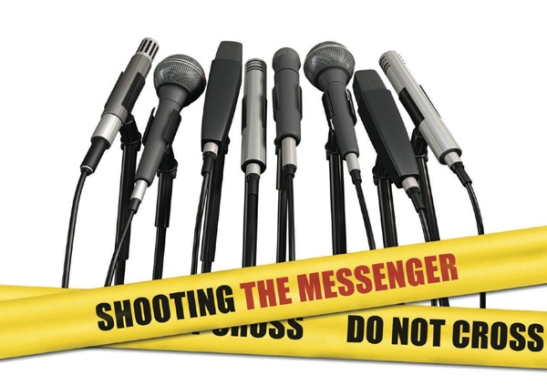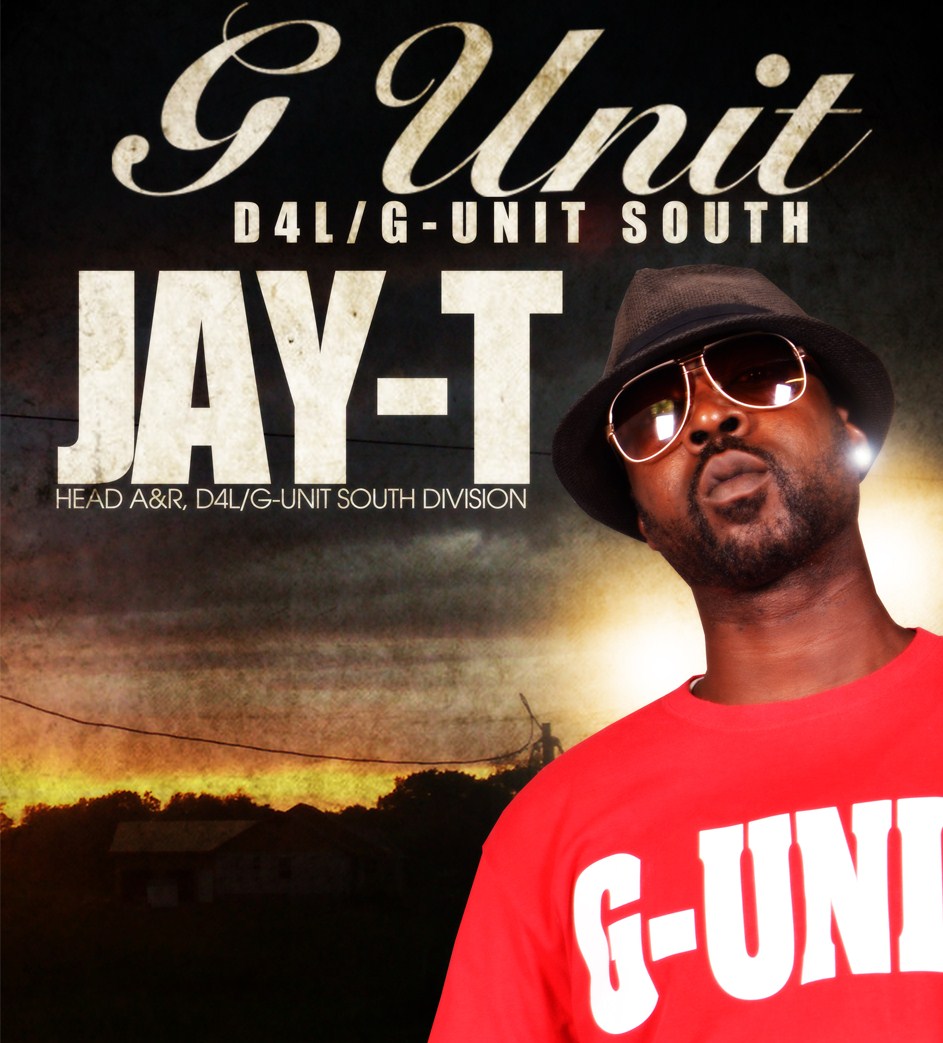Snowden, Manning and the Modern Day Whistleblower
Image Source: popularresistance.org
On the same day the “Bradley” Chelsea Manning[1] verdict came down, Senator Grassley (R-IA) submitted a resolution proposing a national holiday for whistleblowersand unanimously “July 31st” became National Whistleblower Appreciation Day.
The irony is not lost on everyone, for what “appreciation” has been shown to PFC Bradley/Chelsea Manning and NSA leaker Ed Snowden who have been nothing but demonized? Manning now sentenced to a shameful prison term for telling the Truthwhile Snowden’s still on the lam having to make nice with America’s enemies out of necessity as the debate between “hero” or “traitor” rages on here at home.
Shouldn’t the debate be about the content and context of the leaked information?
Isn’t that what should ultimately be important?
There are some who would have you believe the means with which a leaker leaks is moreimportant than all of that and oh, by the way, the leak itself?
Blowing the Whistle
Image Source: 99getsmart.com
Government whistleblowers and other information leakers have one thing in common, a secret. A secret they no longer wish to keep. A secret so immense — at least to the bearer, they feel the world needs to know about it, usually at any cost.
In fact, whistleblowers often “give up everything”, sacrificing their livelihoods, lifestyles, reputations and sometimes their safety, all in order to protect those they believe they are protecting.
In the case of National Security whistleblowers, that usually means YOU.
While most people would remain silent, a whistleblower cannot. Whether the disclosure is about waste, fraud, abuse or malfeasance, the general intent of the whistleblower is to apprise those whose best interests are not being rightfully served.
According to the Government Accountability Project’s Whistleblower.org, their “composite definition” of a whistleblower is taken from combined state, federal and international cases and is,
“An employee who discloses information that s/he reasonably believes is evidence of illegality, gross waste or fraud, mismanagement, abuse of power, general wrongdoing, or a substantial and specific danger to public health and safety. Typically, whistleblowers speak out to parties that can influence and rectify the situation. These parties include the media, organizational managers, hotlines, or Congressional members/staff, to name a few.”
But, There’s a Right and Wrong Way to Blow
Image Source: insidecounsel.com
In July of 1778, Congress enacted the first whistleblower protection laws,
“That it is the duty of all persons in the service of the United States, as well as all other inhabitants thereof, to give the earliest information to Congress or any other proper authority of any misconduct, frauds or misdemeanors committed by any officers or persons in the service of these states, which may come to their knowledge.”
The path to Truth-telling is supposedly laid clear for those who wish to pursue it. TheNational Whistleblower’s Center has even produced a handbook that can be found in libraries across the country.
There are two main types of whistleblowers, “Corporate” and “Federal”.
Both have unique points to ponder for the one blowing the whistle, as well as for those representing him or her in the aftermath.
The laws differ, as do the available protections however few.
Mark Zaid, a Washington, D.C. attorney who regularly represents national security whistleblowers and intelligence cases tells us,
“There are very few realistic protections for whistleblowers. The situation is even worse for those in a national security environment where classified information is involved. In order to establish legal whistleblower status there are requirements with respect to the type, manner and method of disclosures that are made. For national security whistleblowers the statute does not protect a disclosure ‘prohibited by law’ or ‘specifically required by Executive order to be kept secret in the interest of national defense or the conduct of foreign affairs.’ This means that the individual cannot simply decide to disclose classified information to an unauthorized third-party, such as the media, regardless of whether they are a whistleblower or not. Not only do they lose any legal protections they might otherwise have had, but they will have violated various criminal laws of the United States.”
Typically — for both “Corporate” and “Federal” cases one must do the right things in order to have any hope of protection or exoneration of wrong-doing. Although there are no guarantees, Zaid cautions that all legal avenues must be explored saying,
“For all whistleblowers, the usual efforts are – and this will be obviously fact specific to particular situations and can change accordingly – to bring to their supervisor/chain-of-commands attention whatever the issue might be. The individual would also have higher level officials available to them. They can always go to their agency ombudsman if one exists, as well as any number of Offices of Inspector General. If criminal conduct is involved they also have the Dept. of Justice or, where appropriate, the military criminal investigative agencies to approach. Of course, disclosing information to Congress — whether an oversight Committee or an individual member, would constitute a protected disclosure as well. There are other potential avenues beyond all of these. And, of course, there is no specific order required. These approaches can all be pursued at the same time if desired.”
But, not all whistleblowers follow the same legal path for protections and ultimately [hopefully] justice. In fact, some – like those today, do not follow legally acceptedprotocol at all and Zaid says of those like Manning and Snowden,
“It is the national security whistleblower who has a legal obligation to stay within channels or face prosecution. As far as I am concerned, national security whistleblowers have a moral and legal obligation to pursue all available options before crossing the line into criminality.”
Whistling a Different Tune
Image Source: truth-out.org
There appears to be a new breed of whistleblower. Those that were children or very young adults when 9/11 happened. Those who’ve grown up in an atmosphere of increasing government infringement, questionable wars and extensive media induced propaganda.
Few also take into account that technology has played a large role in molding the mindsof this newer generation. A world were citizens are finally waking-up and seeing things that had previously gone unseen or at the very least had been overlooked. Call it a post 9/11 mind, where righteous opinion and an abundance of information meet to become a perfect storm for malcontent heroism.
As Judge Ellis of the Eastern District of Virginia said in 2009 as part of the Franklin espionage case,
“Whistleblowing in itself is not an adequate rationale for leaking classified information. Simply because you believe that something that’s going on that’s classified should be revealed to the press and to the public, so that the public can know that its government is doing something you think is wrong, that doesn’t justify [publicly disclosing] it…. Noble motives don’t erase the violation. However, you may want to go ahead and do it [anyway], but you have to stand up and take the consequences.”
Unfortunately, as society’s capabilities and corruptions have evolved, the laws and “acceptable” avenues for whistleblowers have not. Daniel Ellsberg‘s 1969 and evenColeen Rowley’s 2001 offered far less technology and connectivity than Manning or Snowden’s world of today and it has an impact.
Who is taking into consideration what exactly has motivated and prompted this new generation? Who validates their utter belief – without discrimination or reproach, that “no one can be trusted” and that their very lives are at stake for telling the Truth? What evolution of the laws can accommodate this growing sense of distrust?
Broken Laws…of the Land
Image Source: g92.org
It is very important for National Security employees to know their rights and tounderstand the laws, but what happens when current avenues and laws essentially offer no guarantee of public disclosure of the information or appropriate protection for the whistleblower?
Attorney Zaid says,
“The existing laws completely fail to adequately offer protection in a meaningful or legitimate way, but that does not mean any individual has the right to decide what is best for others. There is a process that does exist and steps need to be taken to first try.”
What happens when a potential whistleblower feels they cannot trust anyone or their information involves those responsible for the very laws they are expected to follow?
Zaid, who is known to have little compassion for those harboring “conspiracy theories”, says,
“It is often the case that a whistleblower cannot follow a certain path of disclosure because the information that is of concern involves those who one would normally report such concerns to. If that is the case, there are other options outside their agency or office that they can turn to. If an individual is so concerned about and suspect of everyone, then quite frankly they generally have far greater problems than what they want to blow the whistle on.”
Or, what if the whistleblower simply feels traditional routes will not allow for the information to become public enough to be worth having blown the whistle and that otherwise no wrong will be made right?
According to Zaid,
“The whistleblower still needs to undertake certain minimal efforts to try to bring the information to the attention of the right people. Again, there is a significant distinction between an individual who has access to classified information than one who does not.”
It makes sense that a person would feel impotent in this situation choosing another course of action, in this era, with that mind-set.
Who then can they turn to? How then can they find a legal leg to stand on?
Media Does Matter
Image Source: disinfo.com
When — if ever, is it OK for a whistleblower to go to the media as Ellsberg did?
Zaid says, only as a “last resort” and that the main mistake of both Manning and Snowden is that they went to the media as a “first resort” instead of attempting to exhaust the legal channels available.
For those who try the legal route to no avail and turn to the media, Zaid advises, “accept the consequences and fight back.”
Manning and Snowden are not the first – nor will they be the last, to leak classified or other information to media sources. The difference is, today’s media no longer supports the whistleblower — as they did in Ellsberg’s day, and instead are obvious proponents for protecting government and corporations.
The director of Project Censored and the Media Freedom Foundation, Professor Mickey Huff says,
“During the 1960s and 70s, the major news media outlets seemed to have an inkling about their role as a free press. While there were gross failures in media coverage of the war in Viet Nam, the corruption of the Johnson/Nixon administrations, when Dan Ellsberg and the Pentagon Papers came along, the press actually published them and stood behind him while Nixon, et al, attacked him, tried to discredit him, and more.”
In comparison, Mickey further explains,
“Today, the press isn’t even timid about covering the established powers, meaning, they are clearly part of them. It is the executive branch, along with its minions in the corporate press that do the propagandistic bidding of their corporate/political overlords. Today, major media talking heads do the attacking, challenge whether someone is a “real” journalist, and play constant games of shoot the messenger. That’s a striking shift that clearly indicates the so-called “mainstream” press is hardly mainstream, it’s merely a mouthpiece for the plutocracy at best, but at worst, it has become an enemy of truth, and an enemy of the people.”
In an NPR interview, Pentagon Papers leaker, Daniel Ellsberg, declared his support for both Manning and Snowden saying they [Manning and Snowden] “did it right” versus how he had initially gone about trying to maneuver through the appropriate legal channels stressing,
“I wasted years trying to do it through channels, first within the executive branch and then with Congress.”
Even still, the media and many on the legal side of the equation refuse to not only acknowledge the realty for a whistleblower today, but also the credibility and importance of whatever information has been leaked.
Attacking the messenger does not change his message.
*Cheri Speak
More articles from Cheri, Click Here
For Reference:
Whistleblower Protection Act of 1989
Ethics in Government Act of 1978
Intelligence Community Whistleblower Protection Act (ICWPA)
Presidential Policy Directive 19
[1] Chelsea Manning was previously known as “Bradley” Manning


